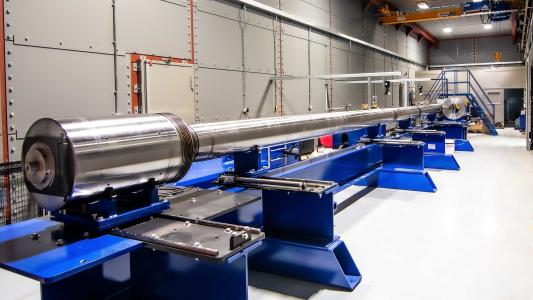 UK-based First Light Fusion, founded in 2011 as a spin-out from the University of Oxford, has been awarded a £6m ($7.4m) grant from the Engineering & Physical Sciences Research Council (EPSRC) to launch its new Prosperity Partnership. Dirat Light will contribute matching funds taking the total programme value to £12m. EPSRC will support the programme until 2028.
UK-based First Light Fusion, founded in 2011 as a spin-out from the University of Oxford, has been awarded a £6m ($7.4m) grant from the Engineering & Physical Sciences Research Council (EPSRC) to launch its new Prosperity Partnership. Dirat Light will contribute matching funds taking the total programme value to £12m. EPSRC will support the programme until 2028.
The Prosperity Partnership will sponsor critical research at First Light and focus on the key physics questions specific to its approach to inertial fusion, which aims at producing energy by compressing a target of fusion fuel using a hypervelocity projectile.
First Light’s inertial confinement approach to fusion method leverages the same physics proven by the US National Ignition Facility (NIF), at Lawrence Livermore National Laboratory (NIF). However, it combines this with a unique approach which involves firing a projectile at a fuel pellet to force it to fuse and produce energy. The approach has been validated by UK Atomic Energy Authority (UKAEA). First Light Fusion in January signed an agreement with UKAEA for a facility to house First Light’s Machine 4 at its Culham Campus in Oxfordshire.
Research using the new grant will be conducted in collaboration with Imperial College London, led by Dr Simon Bland, along with other research partners, including from the Universities of Oxford and York, and Oxford spin-off Machine Discovery.
As part of the brand-new Partnership, First Light will jointly fund 14 Postdoctoral Research Associates, 12 PhD students and 40 undergraduate internships over the next five years. First Light says this will allow it “greater access to the UK’s university talent pool as part of its mission to commercialise fusion energy”. It will also be able to draw on the talent and expertise of its academic partners, funded by the £12m.
First Light has long supported bringing the next generation of PhD students and interns locally and from across leading institutions in the UK. Over the last decade, it has recruited 15 PhD students and hosted 23 internships to undergraduate and postgraduate students, many of which have become full-time employees today. The firm is particularly committed to bringing under-represented groups into the STEM (Science, technology, engineering & mathematics) and fusion sectors, and over the last 10 years, its PhD and internship programme has been a key recruitment pool for the company.
Dr Nick Hawker, Co-founder & CEO of First Light Fusion, said: “We are excited to be launching our next five-year Prosperity Programme with the generous support from the Engineering and Physical Sciences Research Council. This grant… will be a vital platform in recruiting the best and the brightest physicists to First Light, and more critically, unlock important physics research as we continue with our mission of solving the problem of fusion power with the simplest machine possible.”
Dr Matt Betney, former PhD student and now Head of Target Design at First Light Fusion, said: “Conducting a PhD with First Light Fusion was one of the best decisions I’ve made in my career. It allowed me to build my skills as an independent scientist, whilst gaining exposure to the fast-paced world of a fusion start-up. This research grant will enable the next generation of scientists to benefit from this experience.”
Image: First Light’s 22m long prototype steel gun, designed to achieve fusion without using magnets or lasers (courtesy of First Light Fusion)



